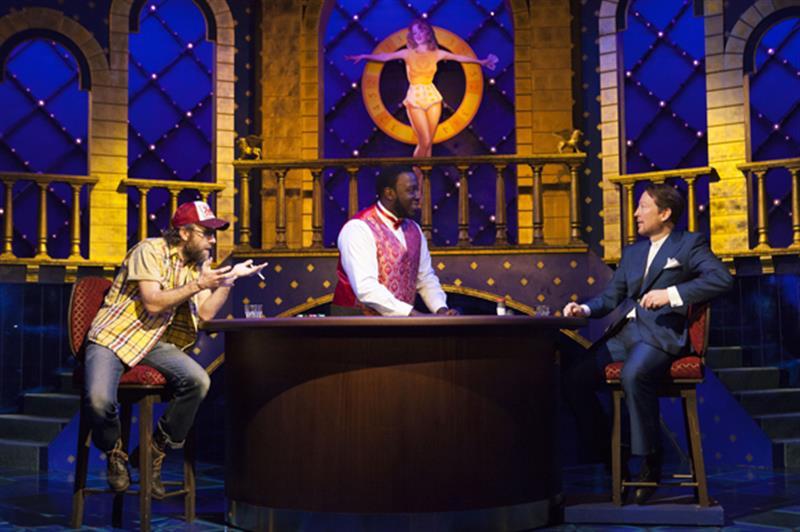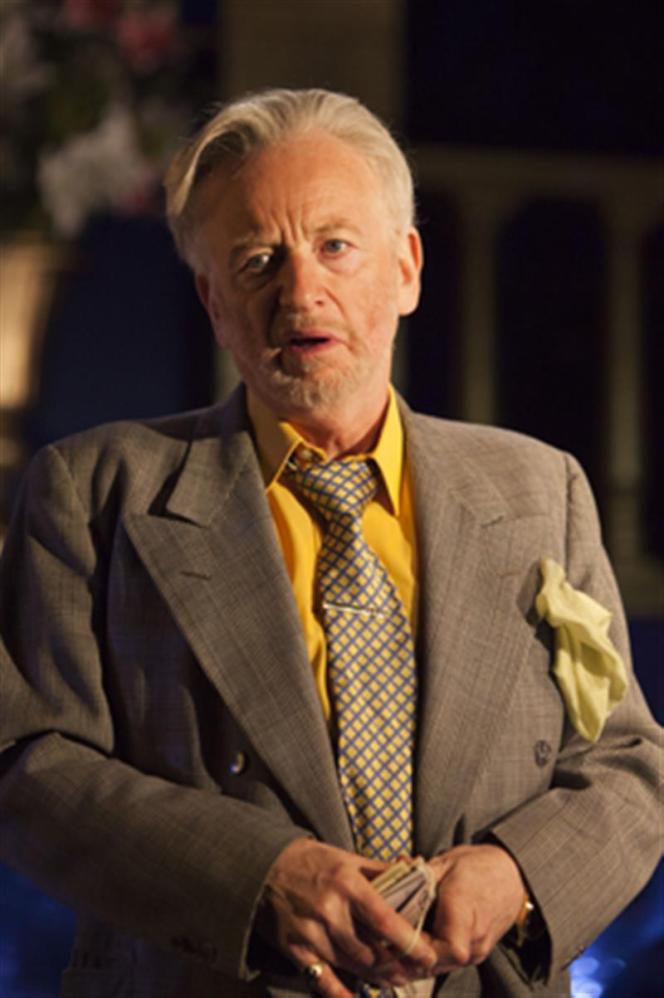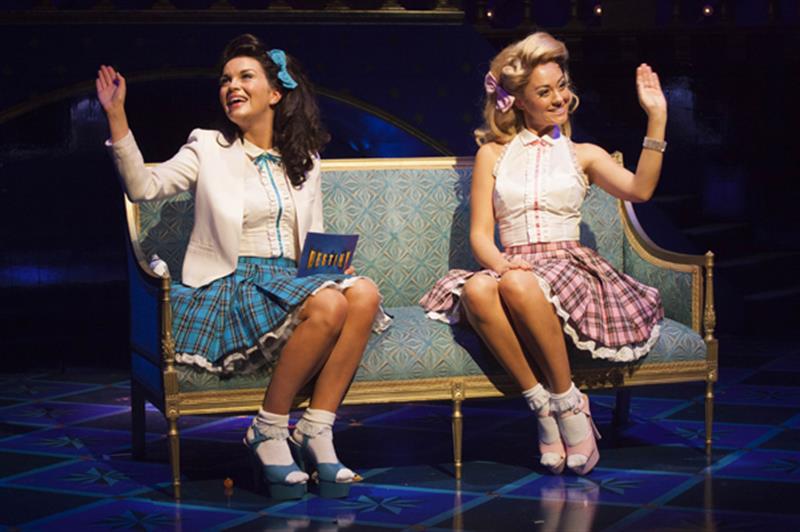The Merchant of Venice, Almeida Theatre | reviews, news & interviews
The Merchant of Venice, Almeida Theatre
The Merchant of Venice, Almeida Theatre
Las Vegas bling lethally demolished in Rupert Goold's layered Shakespeare

All that glisters is not gold in the casino and television game-show world of Rupert Goold’s American Shakespeare, first staged by the Royal Shakespeare Company in 2011. Not all the accents are gold either, though working on them only seems to have made a splendid ensemble underline the meaning of every word all the better – and having come straight from the often slapdash verse-speaking of the RSC’s Henry IV, that comes as all the more of an invigorating surprise.
Goold leads his team inexorably from the swank to the skull beneath the skin, a Shakespearean “problem-play” trope well suited to the American setting and one counterpointed as ever by the brick wall of the Almeida belatedly lit up by Rick Fisher behind the blue and gold of Tom Scutt's Venice Casino. The director dazzles as ever with his usual wealth of cross-reference. Any young wannabe could come up with the idea of Las Vegas for The Merchant of Venice, or a Chinese restaurant for Turandot – Goold’s first London opera production, a brilliant one to my mind – but it takes a dash of genius as well as sheer hard work to carry it through, as he does so assuredly here. Among the parallels to set the mind racing are twists on Legally Blonde – surely deliberate – and the Brecht/Weill city of Mahagonny – possibly not intended. Whatever the case, Brecht's here-you-may-do-anything-so-long-as-you-can-pay-for-it myth is certainly enriched by the further skewing of Shylock’s relentless vengefulness.
 Ian McDiarmid’s mittel-European take on the moneylender (pictured right) can be hit and miss, accent and characterisation wise, and I’ve never found him the most truthful of actors, so the breakdowns, though well motivated, aren’t entirely convincing. But he does make the flesh creep playing a lethal old queen – and that's no reason why this Shylock shouldn’t have a daughter or treasure the memory of his dead wife – as well as in his shift to deadly legalistic precision. There’s a complex human being here, not a stereotyped monster, even if it's not yet in focus, and Goold doesn’t spare us the anti-Semitic nastiness of nearly everyone who rails on "the Jew": the notion that it’s the characters who are racist while the playwright is much more nuanced doesn’t need special pleading here.
Ian McDiarmid’s mittel-European take on the moneylender (pictured right) can be hit and miss, accent and characterisation wise, and I’ve never found him the most truthful of actors, so the breakdowns, though well motivated, aren’t entirely convincing. But he does make the flesh creep playing a lethal old queen – and that's no reason why this Shylock shouldn’t have a daughter or treasure the memory of his dead wife – as well as in his shift to deadly legalistic precision. There’s a complex human being here, not a stereotyped monster, even if it's not yet in focus, and Goold doesn’t spare us the anti-Semitic nastiness of nearly everyone who rails on "the Jew": the notion that it’s the characters who are racist while the playwright is much more nuanced doesn’t need special pleading here.
How wonderful it is to see the juve leads brought properly to life (again, the RSC Henry IV was an example of how not to do it). No problems with the accents here. Tom Weston-Jones’s handsome youth has banked-up rage which may partly account for the disintegration of Susannah Fielding’s not so dumb and not so blonde Portia (pictured below, on the right, with Emily Plumtree). She starts out, in perfect accord with Plumtree's Nerissa, putting on an act for “Destiny”, game-show product of Belmont Studios. The concept is remorselessly funny, cueing virtuoso cameos from Vinta Morgan as a boxing, cocky Prince of Morocco and Vincenzo Nicoli as a hyper-camp, ay-ay-ay Prince of Aragon, doubling their money and opening the wrong boxes, or caskets, as her suitors.
 That Portia must then go to law to stop Shylock taking his pound of flesh from depressed Antonio (Scott Handy, the mirror of stillness to all the hyperactivity around him, until he's faced with Shylock's knife) may briefly evoke the Legally Blonde model. But Fielding’s supposed whizz-kid lawyer speaks on a knife-edge of tension, ringing an excellent change on the “quality of mercy” speech, and we’re to suppose that what she witnesses in court turns her wits. I’m no great fan of the bitter, rather than bitter-sweet, ending in Shakespearean comedy, preferring director Tim Carroll’s notion of being true to the mood of every moment; this Portia’s limping mad-scene to Elvis’s “Are you lonesome tonight?” was the only thing in the show – if rather a crucial one – that didn’t feel perfectly motivated to me.The unhappy ending has become almost as much of a cliché as it now is in the lovers' disorientation at the end of Mozart's Così fan tutte.
That Portia must then go to law to stop Shylock taking his pound of flesh from depressed Antonio (Scott Handy, the mirror of stillness to all the hyperactivity around him, until he's faced with Shylock's knife) may briefly evoke the Legally Blonde model. But Fielding’s supposed whizz-kid lawyer speaks on a knife-edge of tension, ringing an excellent change on the “quality of mercy” speech, and we’re to suppose that what she witnesses in court turns her wits. I’m no great fan of the bitter, rather than bitter-sweet, ending in Shakespearean comedy, preferring director Tim Carroll’s notion of being true to the mood of every moment; this Portia’s limping mad-scene to Elvis’s “Are you lonesome tonight?” was the only thing in the show – if rather a crucial one – that didn’t feel perfectly motivated to me.The unhappy ending has become almost as much of a cliché as it now is in the lovers' disorientation at the end of Mozart's Così fan tutte.
The Elvis overlay, though, in the person of his impersonator Lancelot Gobbo, works entertainingly well, carried off with huge vitality and a versatile singing voice, lovely in crooner mode, by Jamie Beamish. The other young lovers, Caroline Martin’s bookish Jessica prominent among them, are all sharply characterized, and it speaks volumes for Goold’s painstaking rehearsal process that as the two “lovely assistants”, a parallel to the “slaves” that Shylock points out among the male employees, Rebecca Brewer (also playing Stephanie) and Merry Holden make their mark. This classy Shakespeare not only uses the money thrown at it well – there are 18 “creatives” as well as 24 in the production team – but also strikes the perfect balance between entertainment and the paler cast of thought that emerges from Shakespeare’s compelling fantasy.
rating
Share this article
Add comment
The future of Arts Journalism
You can stop theartsdesk.com closing!
We urgently need financing to survive. Our fundraising drive has thus far raised £33,000 but we need to reach £100,000 or we will be forced to close. Please contribute here: https://gofund.me/c3f6033d
And if you can forward this information to anyone who might assist, we’d be grateful.

Subscribe to theartsdesk.com
Thank you for continuing to read our work on theartsdesk.com. For unlimited access to every article in its entirety, including our archive of more than 15,000 pieces, we're asking for £5 per month or £40 per year. We feel it's a very good deal, and hope you do too.
To take a subscription now simply click here.
And if you're looking for that extra gift for a friend or family member, why not treat them to a theartsdesk.com gift subscription?
more Theatre
 Here We Are, National Theatre review - Sondheim's sensational swan song
The late composer bids farewell with a show made-to-order for now
Here We Are, National Theatre review - Sondheim's sensational swan song
The late composer bids farewell with a show made-to-order for now
 Einkvan, Det Norske Teatret, The Coronet Theatre review - alienation times six
Estranged father, mother and son each doubled in Jon Fosse’s mesmerising meditation
Einkvan, Det Norske Teatret, The Coronet Theatre review - alienation times six
Estranged father, mother and son each doubled in Jon Fosse’s mesmerising meditation
 Giant, Harold Pinter Theatre review - incendiary Roald Dahl drama with topical bite
John Lithgow gives a masterclass in delivering a 'human booby trap'
Giant, Harold Pinter Theatre review - incendiary Roald Dahl drama with topical bite
John Lithgow gives a masterclass in delivering a 'human booby trap'
 The Gang of Three, King's Head Theatre - three old Labour ghosts resurrected to entertain and educate
Beautifully written and equally well acted play resonates down the decades
The Gang of Three, King's Head Theatre - three old Labour ghosts resurrected to entertain and educate
Beautifully written and equally well acted play resonates down the decades
 Conversations After Sex, Park Theatre review - pillow talk proves a snooze
Award-winning Irish play fails to reach a memorable climax
Conversations After Sex, Park Theatre review - pillow talk proves a snooze
Award-winning Irish play fails to reach a memorable climax
 Romeo and Juliet, Shakespeare's Globe - swagger and vivacity cohabit with death
Sean Holmes’ Western-style production brings a flamboyant start to the summer season
Romeo and Juliet, Shakespeare's Globe - swagger and vivacity cohabit with death
Sean Holmes’ Western-style production brings a flamboyant start to the summer season
 Krapp's Last Tape, Barbican review - playing with the lighter side of Beckett's gloom
The Irish actor Stephen Rea is a silent-movie Krapp to treasure
Krapp's Last Tape, Barbican review - playing with the lighter side of Beckett's gloom
The Irish actor Stephen Rea is a silent-movie Krapp to treasure
 My Master Builder, Wyndham's Theatre review - Ewan McGregor headlines stillborn Ibsen riff
Starry new writing premiere struggles to connect
My Master Builder, Wyndham's Theatre review - Ewan McGregor headlines stillborn Ibsen riff
Starry new writing premiere struggles to connect
 Dealer's Choice, Donmar Warehouse review - fresh take on a classic about male self-destruction
An ideal revisiting of Patrick Marber's play about risking all to move ahead
Dealer's Choice, Donmar Warehouse review - fresh take on a classic about male self-destruction
An ideal revisiting of Patrick Marber's play about risking all to move ahead
 Much Ado About Nothing, RSC, Stratford - Messina FC scores on the bardic football field
Garish and gossipy, this new production packs a punch between the laughs
Much Ado About Nothing, RSC, Stratford - Messina FC scores on the bardic football field
Garish and gossipy, this new production packs a punch between the laughs
 The Great Gatsby, London Coliseum review - lavish and lively production fails to capture the novel's tortured soul
The production gets stronger in the second half as the shadows of tragedy begin to loom
The Great Gatsby, London Coliseum review - lavish and lively production fails to capture the novel's tortured soul
The production gets stronger in the second half as the shadows of tragedy begin to loom

Comments
A minor correction: Rupert
Thank you, Sarah, I'll go in
Thank you, Sarah, I'll go in and correct that to 'first London opera production', then (not to imply that fabulous Garsington or Batignano, where I think Graham Vick started out, are in any way minor).
I have to say how